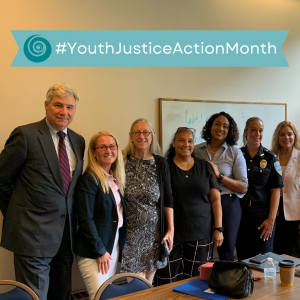
October is Youth Justice Action Month, a time to draw attention to efforts underway to reform juvenile justice practices and the need for a more equitable and rehabilitative system, ensuring that all young people have access to the resources and support they need to thrive.
Earlier this year, the Senate embarked on an effort to overhaul criminal justice legislation including comprehensive reforms to the juvenile justice system. With strong support from Rhode Island Senator Sheldon Whitehouse, the updated legislation will prioritize early intervention, diversion, and prevention programs, offering our youth a more promising path towards rehabilitation and success.
As an established community-based service provider, Tides Family Services has taken a nontraditional approach to youth intervention for over 40 years, effectively diverting thousands of Rhode Islanders from the justice system. Through compassion, mentorship, and an unwavering commitment to our mission, we create life-changing opportunities for at-risk youth, helping them build a path towards a brighter, more hopeful future.
Decriminalizing Truancy
Truancy isn't just about kids skipping school. It happens for various reasons that can create hard choices for children and their families. For example, some kids miss school because the school bus schedule doesn't work well with their parents' work hours. Others stay home to take care of a sick sibling so their parents won't lose their job. These situations show that truancy is often linked to bigger problems that need understanding and support to solve.
Students or their parents can also face legal consequences, like fines and court fees, for missing school. These consequences for missing school can make them feel unwelcome and further alienate them from the school system. Removing kids from school for longer does not inspire a good relationship with education. The real challenge in addressing absences is to make sure children actually want to go to school. That's what we need to focus on.
For years, educational and legal inequities have grown wider for many disadvantaged young Rhode Islanders due to school absenteeism. We must also acknowledge that chronic truancy often signals underlying issues such as family problems, mental health concerns, or learning disabilities. Treating truancy as a criminal offense can exacerbate these problems. Instead, addressing the root causes with support and guidance can make a profound difference in the lives of these young individuals.
Early Intervention and Support
To address the causes of truancy, we need to invest in early intervention programs including counseling, tutoring, mentoring, and mental health services that identify and address at-risk youth before they begin to miss classes. Sometimes the solutions can be simple – like regular phone calls to parents when a child starts missing school. Open and respectful communication can often uncover the root causes and help parents and guardians to understand the importance of consistent attendance.
If the issue persists, the next step is escalating to home visits. A successful example of this approach comes from Connecticut, where $10.7 million of the state's COVID relief funds were used to implement a successful home-visiting program. This program resulted in a remarkable 10% improvement in attendance rates. These home visits enable a deeper understanding of the challenges families may be facing and allow educators to provide the necessary support to help children get back on track with their education and reduce their likelihood of becoming involved with the legal system.
Diversion and Prevention
Diversion programs offer a second chance to youth who have already entered the system. These alternatives to traditional incarceration can lead to rehabilitation, not recidivism. It's essential that we continue to develop and expand diversion programs that provide opportunities for restorative justice for young people and equip them with the skills to make better choices in the future.
Prevention remains our most potent weapon in the fight against youth involvement in the criminal justice system. By addressing the social, economic, and educational factors that contribute to delinquency, we can foster a safer, more nurturing environment for our youth.
This Juvenile Justice Month, let's recommit to reimagining and reshaping the future of young Rhode Islanders. By embracing these principles of recovery, we can offer hope, support, and the chance for a brighter future for our youth.

